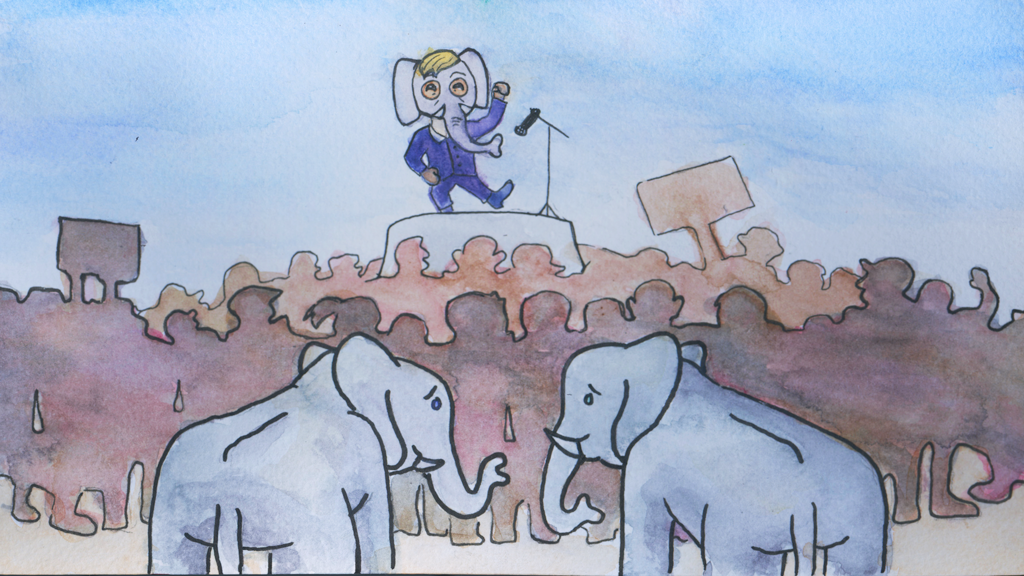Denouncing Trump and the Bleak Outlook for the Republican Party
by Ryan Black | published Nov. 6th, 2016
Ever since the release of Donald J. Trump's now infamous "locker room talk" tape, and the revelations that what he said was more than just words, the polls and forecast for his chances of winning have gone in the direction one might have expected. And as we all now know, hoping that that may have been what finally made Donald feel shame, as well as any notions of him stepping aside, was a pipe dream.
No, having seemingly resigned any efforts of appearing like a candidate trying to reach more people, Trump instead saw this as "the shackles" being taken off, or his chance to indulge the 38 percent (and his ego) who would never leave him in all the anti-government, anti-democrat and anti-Hillary toxicity they could ask for. It is the same kind of rhetoric that has been angrily spewed at them by the likes of Rush Limbaugh, Sean Hannity and many others for 20 years. Rhetoric which has done little for actual progress, but has done a great deal in fueling an ever-more divided political discourse.
If I sound bitter it's because I am. As a Republican watching this stage of the election, it's become that much more painfully apparent the hate we've let fester inside our party. A mistake made for what else: political gain. Moderate Republicans have long been willing to look the other way because of the coalition that their numbers helped build with those of us with more centrist views.
Yet we live in a country that has and continues to be one grappling with social change. I personally have seen Republicanism as recognizing everyone's right to live their life the way they want — both socially and fiscally. So I've struggled for instance to grasp how some Republicans further to the right have reconciled their views on topics such as same-sex marriage and the rights of transgender people, while at the same time making calls for the government to get out of peoples' lives. It's a dynamic that practically embodies the notion of cognitive dissonance. Those of us towards the center have also recognized that one of the realities of government is compromise and that it's alright to listen to the other side as no one should claim to have all the answers.
If the candidacy of Donald Trump stands for anything, it's misplaced grievances with such ideas, the fear of "the others" and how compromise with the "establishment Republicans" on such matters should no longer be tolerated. This sizable portion of the Republican electorate was waiting for someone like Trump to channel their feelings, but perhaps the most worrisome part is that they'll still be there after this election.
The sentiment to run a "true conservative" who will fight against the "liberal media" and "corrupt Democrats" will still exist, and, as we're already seeing Trump do, it will include a similar, never more pronounced disdain for Republicans not willing to get on board. For even the most coldly pragmatic of the GOP, this should be troubling. Through their own research after its loss in the 2012 Presidential election, the Republican party confirmed that if the GOP wished to remain nationally relevant in the future they would need to drastically expand the scope of its supporters. By doubling down on Trump's 38 percent, they do the exact opposite of that.
With Trump's chances for victory continually sliding, one might think this to be the chance for Republicans to denounce not only because it's the only decent thing to do, but also because of the long-gestating need for change within the party. If there was a time to separate the future direction of the Republican Party from what Trump has come to represent, it would be now.
However, the indecisiveness from party leaders like Paul Ryan and Mitch "I actually run away at the mention of Trump" McConnell have been emblematic of the unwillingness to do so. They're are literally afraid of losing the votes of the most consistent Republican voters that exist. Entertaining them exclusively only shrinks the appeal of the Republican Party at an accelerated rate and makes any possibility for a presidential resurgence seem like an increasingly fleeting notion. It shows that the GOP is a party not seeking to represent — or work with — anyone but such a small portion of the country.



